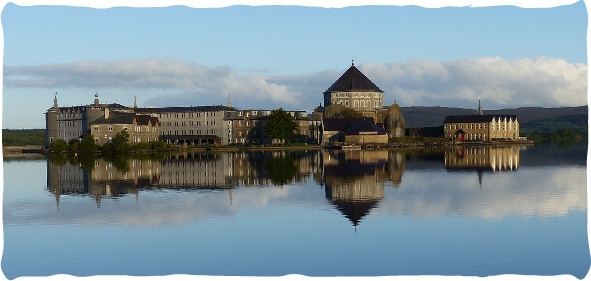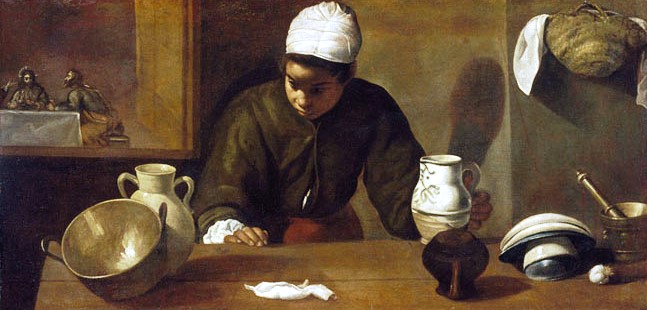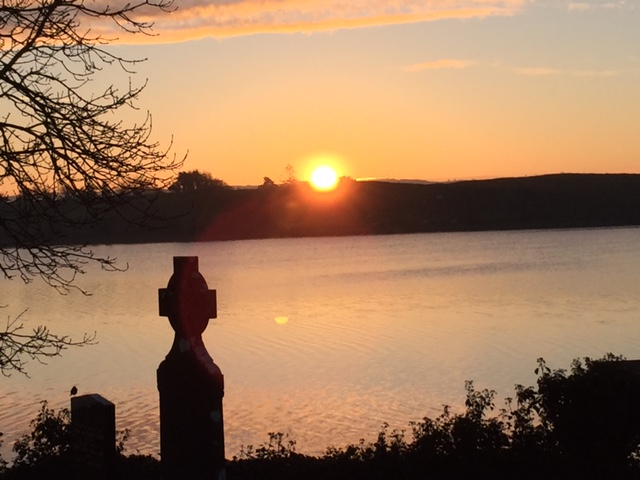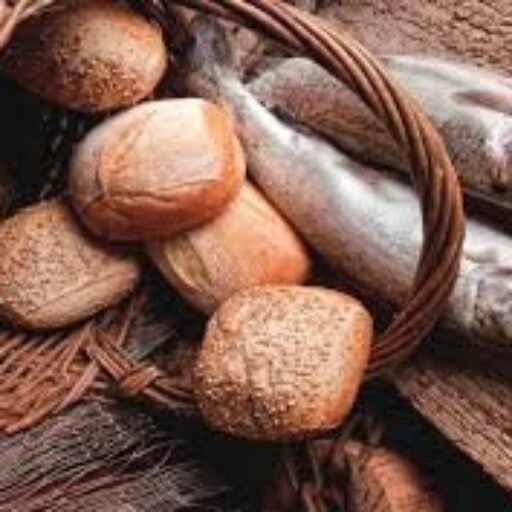
by Vincent | May 23, 2017 | General Interest, Reflections, Religion
Yesterday, with close on forty people from our parish, I visited Lough Derg for the One Day Pilgrimage. In his words of welcome, Fr Owen Joe McEneaney referred to Fr Eamonn Conway’s book on Lough Derg “Island of Quiet Miracles” and commended the book to all present. He also mentioned that I had written a short review of the book. It featured some months ago in The Furrow magazine. Thinking about Lough Derg this morning, I thought it might be good to include that review here as well.
Thanks to all who joined us yesterday. God bless the work of all on Lough Derg and the Faith Journeys of all who travel there for the one or three day pilgrimage.
LOUGH DERG (Island of Quiet Miracles) by Fr Eamonn Conway
“To hear the whisper of the Lord,
you must turn down the volume
of the world. Find time to
disconnect from everything
around you and
be still in His presence.”
These lines, by an anonymous pilgrim poet, echo the work of Fr Eamonn Conway in this publication. Fr Conway’s belief in St Patrick’s Purgatory, like its encircling lake, runs deep. Because of this he wishes to remind those who have visited of its blessedness and arouse interest in the pilgrim-to-be.
There is a well-researched overview of Lough Derg’s history that, I suspect, may be revelation to many regulars on the Island. The present day format and “vigil” are contrasted with a more prolonged pilgrimage of the past when pilgrims were encaged for three days in a structure not allowing even standing room. It is interesting to note that just before the Famine 30,000 pilgrims visited Lough Derg and reassuring that today the constant stream of visitors to the Island is on a par with the highest points of its long and faith-filled history.
“Making sense of not yet” (p17) and linking the pilgrimage with the “fifth gospel” the Sea of Galilee, the author leaves no room for doubt – this is a place of prayer where encounter with God is not alone possible but probable. The point is made that it’s not that God is more likely to be in remote locations but that it may be easier to be present to Him there due to lack of distraction. The Pilgrimage is about conversion and “can be a valuable moment to reconnect with Christ in the community of the church”. (p45)
Fr Conway spends some time in exploration of the current culture in which we seek to live the Faith. Leaving the Island, in the physical journey to the shore, is paradoxically an invitation to bring what was encountered there to the mainland of our lives.
The book is introduced by Bishop-Emeritus Liam MacDaid and concludes with a reflection by the Rector, Fr McEneaney. Text is interlaced with photographs, including a picture of the Basilica perfectly reflected in the still waters of Lough Derg. A fitting image, it would seem, for the pilgrim having found him or herself afresh, standing tall again – renewed and strengthened.
It is clearly a work of the heart, thoroughly researched, beautifully presented and rooted in Jesus’ response to his early disciples when asked where he lived; “Come and see”.


by Vincent | Apr 23, 2017 | General Interest, Reflections, homily
There have been many references to Pope Francis’ repeated call to bishops – indeed to all involved in ministry – to “know the smell of the sheep”. It’s a challenging but necessary call to get to know people and not just from a distance. It involves being with them in the ups and downs of life.
Patrick Kavanagh in a poem called “Father Mat”, describes the local priest as he was encountered by his flock “He was part of the place/Natural as a round stone in a grass field;/He could walk through a cattle fair/And the people would only notice his odd spirit there”. In the same poem he speaks of people’s attitude towards going to Fr Mat to celebrate the Sacrament of Reconciliation (Saturday Confessions): “The knife of penance fell so like a blade/Of grass that no one was afraid.” I think Pope Francis would be happy to share a parish with Father Mat. Chances are we all would!
Kavanagh remembers this priest and puts him before us in verse not because he was a fireball in the pulpit or because he built churches, schools and halls but because he moved among his people. He knew them. He most likely never said it in as many words but it seems clear, he loved them. He saw before him, behind and around him, people in need of love and that bit of compassion that never ever goes astray. He embodied mercy – Divine Mercy.
On Divine Mercy Sunday there’s a call going out to us all to be kindly in our dealing with others, to avoid being judgmental or condemning. We are asked to hear again and again Jesus’ first words in nearly all his post-resurrection appearances: “Peace be with you”. Anything in us, about us or from us that is not encouraging “peace” is most likely not rooted in faith or a clear and thought out understanding of the Gospel message.
We are born to live. We are baptized to belong. We are here to make a difference. What “locked room” can we walk into today or in the coming days? Is it an ongoing row? Is it a strained relationship in the home? Is it a reluctance to acknowledge our own sinfulness and need for repentance? Is it doubt? What locked door stands between us and peace right now? We need to be honest enough with ourselves and others to recognise and name this door and we need faith, hope and every ounce of love that is within us to find the key, unlock and set free what is trapped within.
Recently Pope Francis spoke to the bishops of Ireland. He might or might not have mentioned the smell of the sheep to them but either way they know where he stands on that. He spoke to them about the “apostolate of the ear” – the need to listen to people and respond to what is heard. There’s a lot in that. Kavangh’s Father Mat seemed to have mastered it and that’s something to be thankful for – people who listen to us when we need to speak. Chances are though, we need that same “apostolate of the ear” when it comes to ourselves so that we can truly hear what we need to hear from our own hearts so that we can be set free, like Lazarus of the Gospel, like Thomas who had his doubts, like the disciples who had locked themselves away.
Only then can we truly appreciate the “Mercy” of the Shepherd. Only then are we in a position to shepherd (care for, truly love and mercy) those around us, depending on us for example and love. Only then can we truly grasp the depth and gift of mercy.

by Vincent | Apr 20, 2017 | Reflections, Lent 2017
This is the text of a homily included in “Homilies for April” in the Furrow
“Were you there when they found the empty tomb ….” so goes the old Spiritual and it leads us to that challenging line “sometimes it causes me to tremble, tremble, tremble” … There are many versions of this hymn and many ways to sing it but the lyric is constant. Questions in song: “Were you there when they crucified my Lord?” “Were you there when he died upon the cross, laid him in the tomb, when the sun refused to shine ….” and always leading to the tremble – the response.
Isn’t there something good about that? There’s a response and a real one in trembling because it says something in us has been touched by an experience. Someone once said the best remedy for “trembling legs” is to kneel! To pray! Respond! At the heart of everything our faith is about and every word uttered by Christ is the desire for response.
We have it in abundance in all our Scripture and Liturgy of the past few days. “Behold the wood of the cross on which hung the saviour of the world”. “Come let us worship”. “The Light of Christ” “Thanks be to God”. “Do you reject Satan and all his works and all his empty promises?” “I do”. Cornelius’ household addressed by Peter “you must have heard about the recent happenings in Judea” (Response).”This day was made by the Lord” “We rejoice and are glad” (Response). “Since you have been brought back to true life with Christ you must look for the things that are in heaven” (Response) “Get rid of all the old yeast” (Response). Early that Easter morning they went to the tomb (Response). When they found it empty they went in search of the others (Response) and hearing the women’s story two disciples run to the tomb (Response). On seeing the tomb emptied, the truth dawned “Till that moment they had failed to understand the teaching of scripture, that he must rise from the dead”. (Response)
If the women didn’t go to the tomb how could we have known it was empty? If the apostles didn’t run to the empty tomb how could the truth have dawned for them? If Peter didn’t bother speaking to Cornelius and his household how could a conversion take place? If the men hadn’t walked and talked on the road to Emmaus how could he have joined their conversation? If there’s no response – meaningful response – to this day, to the journey we’ve been on since Palm Sunday, no since Ash Wednesday, something will be missing from our lives and a Sacred Story will go un-shared.
This Easter Day is an invitation to faith in the Risen Christ and to the lasting consolation that is the empty tomb. It is a day to hear and keep close to the heart the Easter Day stories of slowly coming to realise that He is risen. Like all invitations, some are more welcome and expected than others but out of courtesy and better again friendship, there is a need to reply. He is inviting you to the celebration in its entirety, the celebration of life and love that is around us. In a strange way too, of course, he is inviting us to “the afters”! When the living is done, the journey complete the invitation does not end. “I go,”, he told them “to prepare a place for you …. that where I am you may be too.”
It’s mighty that we are here. It’s mighty that you are all here – we have heard it all again, gone through those days again, stood at the Cross and the Empty Tomb again and now there’s only one thing needed – Response! Respond with faith, through faith and in faith.
Sometimes it causes me, causes us (and it should) to tremble, tremble, tremble ….

by Vincent | Apr 18, 2015 | General Interest, Reflections, Religion
“The disciples told their story …..” There’s something fresh and wonderful about that. It’s like being at a movie or out for a meal and wanting to share that moment with others. We’re almost not happy until we get a commitment from the ones being told – “Yeah, I must go to see that. I look forward to going there sometime … thanks for letting me know”. The story they told was one of a personal encounter with Jesus. It was an encounter, like many of the best ones, which took them by surprise. He was quite literally the last person they expected to see. How many times had they told and re-told that story? “We were walking along. It was a long and difficult walk. Our hearts were broken and we just couldn’t get our heads around the thought that he was gone. Then this man was with us. He asked us what we were talking about. Oddly enough it didn’t seem wrong for him to ask and we began to tell him. The road seemed shorter and the conversation went to a place we’d not expected. Our hearts burned within us. And then, we finished up in a restaurant and he gave us broken bread … that’s the moment we knew who he was …..”
We need somehow, with these men, to make this story our own. We need that encounter with Jesus. We need to feel him beside us, hear the sound of his footsteps on the gravel of our roads too. For that to happen we need to be talking about our faith. It was in response to their faith-based conversation, the Lord entered their journey. If they’d been talking about sport, last night’s episode of our favourite soap or catching up on someone’s latest rant on some topic removed from them, how difficult it would have been to enter their moment. But no, they were talking about their faith being shaken, their Lord being taken and he heard where they were and it was only natural that he’d join them. There’s a message in all of this for us today. If we want him to talk with us, we must be prepared to talk about him – to talk with him, walk with him, sit at table with him and allow ourselves be nourished by the broken bread that is his body.
He does it again, just now. As they’re telling their story he walks into their midst. He assures them he is flesh. He’s not at some sort of heavenly remove or untouchable. On the contrary he says that they should touch him, feel the very essence of him and be convinced and hear again the message that all he said, all that was written about him had to be fulfilled and has to be fulfilled. The Lord desperately wants us to know He’s here for us and with us. There’s no high level of security keeping us at a pre-determined remove. That’s one of the things we like so much about Pope Francis – his gift of connect. He knows his place is among people and he knows this is where the Lord wants him to be.
Where to for all of us today on the road from Emmaus? The road to it was one thing but the real difference is made on the road taken afterwards. The same can be said of our coming to Mass today. Where to from here? How ready are we to talk about him as we go? How open are we to his joining in our conversation? How tuned in are we to the reality that unless we are prepared to talk about him and to him, it’s very difficult for him to enter our journey?
You are witnesses to this!
________________________________________
Homilies for April – “The Furrow” – Vincent Sherlock

by Vincent | Apr 5, 2015 | General Interest, Reflections, Religion
I heard a story once shared by the late Archbishop Joe Cassidy that might have a place in today’s liturgy.
He spoke about his childhood days in Charlestown, Co. Mayo and his love for the cinema. He often referred to this as the escape into another world that we all look for from time to time. Going to the cinema was a highlight of his young life. To get there, the saving had to be done. Coins gathered and set aside to secure the ticket. One way of gathering coins was by collecting jam jars and returning them to the shop. He said he recalled one day that he wanted to go to the cinema but he could not find a jam jar. He went to his mother’s cupboard in the kitchen and saw there a jar and he knew that if he brought it to the local shop, the money received would secure his ticket. There was one problem. The jar was half full. He said he looked at it for a while, wrestled with the temptation and then closed the door, leaving the jar on its shelf. He said he learned a lesson that day. The jar was no use to him, unless it was empty. Joe shared this story on an Easter Sunday morning and added, “Neither is the tomb”!
Recently I met a priest who seemed a bit fed-up. I looked at him and said “They found the empty tomb” – in fairness, he smiled and a chat followed. Like the women and men in the Gospel story of this Easter Day, we can fail to understand the meaning of the Scriptures that he must rise from the dead. Our focus can be on the sealed tomb – its heavy stone in place and our questions around “who will roll away the stone?” rather than coming to an acceptance that the stone “which was very big”, had been rolled away by the Power of God’s Hand.
Our world, both global and personal, can all too easily be plunged into darkness and despair. Recent times have brought us face to face with devastating cruelty. People’s lives discarded with a barbarity matched only by the accompanying and stomach churning use of social media. This and so much more serves only to drive deep into the hearts and flesh of family and friends, the coldness of the hammered nails. There are as well and more local to us perhaps, personal battles and demons that crowd in on us and block the light. All too well, we know the confusion of those who loved Jesus as they watched the skies darken over Calvary.
It is perhaps in that very awareness we find again the light. As he knew what it was to suffer, to watch pain scrape its way across the faces of those he loved, to be misunderstood and sacrificed – it is here we meet God with us – the “Emmanuel” of Christmas and with us he says “this too will pass”. There is a today in all of this and a Paradise. There will be a stone rolled back, an empty tomb and a ticket secured.
A ticket – not to a cinema, long closed, in Charlestown but to an eternity ever open by the one who conquered Calvary, rested in the borrowed tomb and left behind the chains of despair and the taunts of brokenness. “He is not here. He is risen!”.
We are here and, with Him, we are risen. Light the light then. It’s so much better than cursing the darkness.
__________
From “THE FURROW” “Homilies for April” (Vincent Sherlock)






